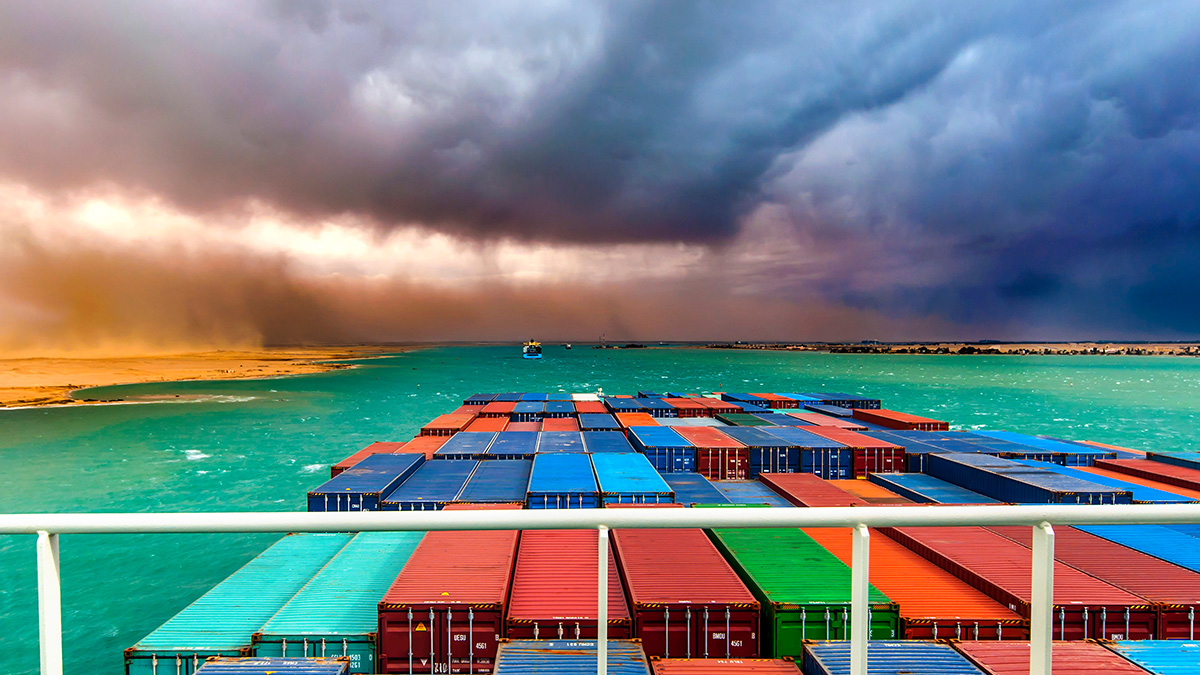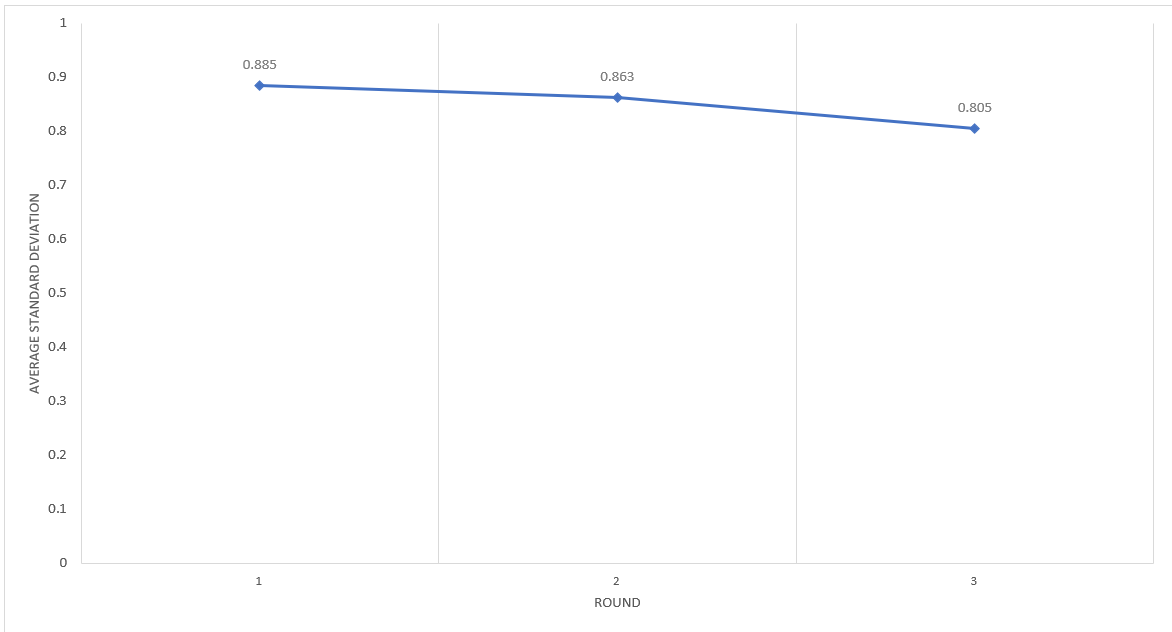by Mikael Lind, Wolfgang Lehmacher, Jacob A. Reinhart, Richard T. Watson, Jillian Carson-Jackson, Sukhjit Singh, Article No. 105 [UNCTAD Transport and Trade Facilitation Newsletter N°98 - Second Quarter 2023]

© Adobestock | Suez Canal, Egypt. Container ship going through desert storm
Understanding how recent disruptions have shaped the shipping industry's views and expectations for the next three years horizon was the goal of a recent survey. Three schools of thought emerge, with decarbonization being a primary concern, followed by sustainability and maritime informatics concerns.
As actors in a self-organizing ecosystem, strategic minds in the maritime sector should be alert to what their peers consider to be critical challenges they expect to encounter in the immediate and mid-term. This enables decision-makers to calibrate their strategic choices and align on areas of shared interest to optimize the deployment of resources to raise productivity across the industry through consistent practices.
Introduction – why the maritime sector must align its actions
As the maritime sector is responsible for moving approximately 80% of the world's goods by volume, coordinated decision-making is critical, particularly for digitalizing and decarbonizing maritime transportation. Action alignment can help reduce inefficiencies, improve the flow of goods, and reduce delays and costs, leading to increased competitiveness of those participating in the effort. Action alignment is also one of the cornerstones of the newly formulated CDES paradigm (collaboration and digitalization for economic and societal capital creation), which claims that economic and societal value can be boosted by symbiotically driving collaboration and digitalization.
This contribution primarily focuses on our interpretation of the findings of our recent study. Understanding the maritime sector’s expressed/prioritized and unexpressed/deprioritized concerns are valuable inputs, particularly for strategic planning, policy-making, and pertinent applied research and practitioner education.
A Delphi study to identify currently perceived industry issues
A Delphi study reveals opinions from a panel of experts and drives consensus on their importance.[1] The approach differs from single-round surveys in that it permits participants to view the input of panel peers, allowing the results of previous rounds to influence their views in subsequent rounds. The goal is to drive opinion convergence. Engaging a panel of relevant experts ensures that the resulting consensus is based on a high level of domain knowledge.
A study was conducted in February/March 2023. The initial themes identified were generated by 49 maritime industry experts from a pool of 250 possible participants. The experts are from areas such as operations, consulting, academia, research, media, and law. Most described themselves as operations personnel and consultants. In the first survey, the experts were asked to report what they thought will be the three greatest challenges within the maritime sector over the next three years. Table 1 summarizes the outcome of this survey.
Table 1: Initial issues in their frequency of mention
|
|
|
In round 1 of the Delphi study, participants rated the 20 initial issues (Table 1) on a 1-5 scale, with five the most challenging. There were 57 responses (i.e., 26% of those invited to participate).
The objective of the subsequent second and third rounds was to achieve a consensus by sharing the results from the first round with the participants. Participants were asked twice more to rate each issue on the same scale. There were 40 responses for round 2 (18%) and 39 for round 3 (17.9%). The experts were invited to participate in each round, so the same people might not have responded to every round.
Using the average standard deviation as an inverse measure of consensus (the higher the standard deviation, the lower the consensus), we see (as expected) an increase in consensus over the three rounds.

Figure 1: The decline in the standard deviation indicates an increase in consensus.
We report each of the 20 themes' mean rating for each round (Table 2). The topics are sorted on the mean rating for the final third round. The leftmost column reports the initial ranking (Table 1).
Table 2: Mean rating for each issue for each round
|
|
Issue/Round |
1 |
2 |
3 |
|
1 |
Decarbonization |
4.42 |
4.33 |
4.62 |
|
4 |
Environmental sustainability |
4.49 |
4.40 |
4.44 |
|
3 |
Effective digitalization |
4.3 |
4.30 |
4.31 |
|
17 |
Energy efficiency |
4.26 |
4.10 |
4.26 |
|
7 |
Cybersecurity |
4.51 |
4.25 |
4.21 |
|
2 |
Data exchange |
4.39 |
4.23 |
4.10 |
|
14 |
Maritime safety |
4.30 |
3.83 |
4.00 |
|
5 |
Maritime standardization |
3.97 |
3.88 |
3.95 |
|
10 |
Seafarers’ working conditions |
3.88 |
3.85 |
3.87 |
|
13 |
Supply chain resilience |
4.05 |
3.80 |
3.82 |
|
15 |
On-time arrivals |
3.67 |
3.73 |
3.59 |
|
6 |
Automation |
3.81 |
3.45 |
3.54 |
|
19 |
Geopolitics |
3.53 |
3.55 |
3.49 |
|
12 |
Trade sustainability |
3.86 |
3.60 |
3.49 |
|
8 |
Regulation |
3.75 |
3.60 |
3.36 |
|
11 |
Human capital investment |
3.81 |
3.53 |
3.33 |
|
16 |
Maritime investment |
3.54 |
3.43 |
3.33 |
|
20 |
Maritime governance |
3.51 |
3.10 |
3.26 |
|
9 |
Price/capacity management |
3.51 |
3.30 |
3.03 |
|
18 |
Financial resource allocation |
3.28 |
3.23 |
2.90 |
Three schools of thought
Decarbonization is a primary concern for the maritime sector, followed by other challenges under the umbrella of sustainability and maritime informatics. These groups, however, aren’t mutually exclusive as some of the terms overlap – demonstrating the complexities within the maritime sector and the consequences this causes. For example, decarbonization and energy efficiency are essential to reach environmental sustainability. Data exchange, (digital) maritime standardization, and cyber security are important means for effective digitalization and on-time arrivals.
There are differences in the expressed views among those that participated in the study. By factor analyzing the respondents’ ratings,[2] we can assign positive and negative loadings to their answers. We identify three schools of thought that explain over 58% of the variance in opinion, as shown in Table 3, where ‘+’ is considered more important, and ‘-‘ is less important.
Table 3: Three schools of thought identified by factor analysis
|
|
Issue |
Maritime standardization (Factor 1) |
Business threats (Factor2) |
Social & environmental (Factor 3) |
Consensus |
Difference |
|
1 |
Environmental sustainability |
+ |
||||
|
2 |
Decarbonization |
+ |
||||
|
3 |
Effective digitalization |
✔︎ |
||||
|
4 |
Cybersecurity |
+ |
||||
|
5 |
Data exchange |
✔︎ (+) |
||||
|
6 |
Energy efficiency |
+ |
||||
|
7 |
Maritime standardization |
+ |
||||
|
8 |
Seafarer's working conditions |
+ |
||||
|
9 |
Maritime safety |
✔︎ (+) |
||||
|
10 |
Supply chain resilience |
- |
||||
|
11 |
On-time arrivals |
✔︎ |
||||
|
12 |
Trade sustainability |
+ |
||||
|
13 |
Regulation |
✔︎ |
||||
|
14 |
Geopolitics |
✔︎ |
||||
|
15 |
Human capital investment |
✔︎ |
||||
|
16 |
Automation |
- |
||||
|
17 |
Maritime investment |
- |
||||
|
18 |
Price/ capacity management |
- |
||||
|
19 |
Financial resource allocation |
- |
||||
|
20 |
Maritime governance |
✔︎ |
The first group (Factor 1, 23% of participants) identifies maritime standardization as an important school of thought. Standardization has long been viewed as a driving force to align the different participants in the self-organized global shipping ecosystem. Maritime standardization is associated with digitalization, but other aspects, such as standardized procedures, processes, and physical infrastructures (such as containers), also concern maritime standardization. Table 3 also indicates some disagreements on data exchange.
The second school (Factor 2, 22% of participants) identifies decarbonization, energy efficiency, and cyber security as highly important. Those three dimensions may seem scattered, but decarbonization and energy efficiency are complementary as they are pieces of the same puzzle for achieving a more sustainable maritime sector. Recently, maritime conference agendas have emphasized digitalization and decarbonization as connected themes. However, as required within decarbonization and energy efficiency, digitalization is an enabler requiring enhanced connectivity. Given the experience of cyber-attacks affecting the maritime ecosystem and the need to respond to the societal concerns of enhanced sustainability, this school of thought is driven by business threats that challenge existing practices.
The third school of thought (Factor 3, 13% of participants) addresses social and environmental sustainability. There is a positive consensus on maritime safety, which links to this third school.
Surprisingly, the role of the maritime sector in global trade reflected in the importance of supply chain resilience and trade sustainability didn’t emerge as a distinctive fourth school. The maritime sector seems primarily concerned with becoming more sustainable and digital, two crucial topics that have dominated the maritime industry discourse over recent years. Nevertheless, resilience was high on the supply chain wish list in 2021 and 2022. Projects like the virtual watch tower for data-powered collaborative supply chain management (www.virtualwatchtower.org) may drive changes of views in this respect going forward.
Conclusions
Digitalization/standardization, decarbonization, and social and environmental sustainability have been identified as clear priorities across the three schools of thought, with a strong consensus on maritime safety. Views on significant topics like data exchange, regulation, geopolitics, human capital investment, and maritime governance are diverse. Here, research has a role in ensuring that all aspects and the concerns of all stakeholders are addressed to ensure the effective functioning of the self-organizing supply chain and logistics industry.
The good news is that many experts agree that future three-year strategic plans should include measures to tackle digitalization and (climate, environmental, and social) sustainability. The difference in opinions, for example, on data exchange may reflect a lack of conviction and underlying concerns resulting in hesitation in driving developments with significant effort across the industry. The traditionally limited trust in the transport and logistics sectors, possibly reinforced by the recent erosion of trust on the geopolitical level, reflects the current course, which should be reversed.
The survey shows that the spectrum of challenges to be addressed is extensive and further prioritization is needed. Unsurprisingly, digitalization is anticipated to continue to play an important role in the maritime industry. We happily notice that social and environmental themes are on the to-do list. While digitalization can enhance sustainable models and practices, it is only part of the mix. What we have been missing is the mention of collaboration as an issue.
Today’s world needs to consider adopting the principles of CDES to boost economic and societal capital creation. This Delphi exercise may help to raise awareness about the said and unsaid to drive consensus and inclusive development. We feel inspired and encouraged by the outcome of our first exercise of this kind and look forward to the next Delphi study in the second half of the year to identify short-term industry issues which we think are relevant for calibrating the operational focus in 2024.
[1] Linstone, H. A., & Turoff, M. (1975). The Delphi method. Addison-Wesley
[2] Thomas, D. M., & Watson, R. T. (2002). Q-sorting and MIS research: a primer. Communications of the AIS, 8, 141-156.
Acknowledgment
We are grateful for all the participants that were part of and followed the progress of the Delphi study.
Contact the authors:
Mikael Lind | Research Institutes of Sweden (RISE) & Chalmers University of Technology | Mikael.Lind@ri.se
Wolfgang Lehmacher | Anchor Group & Topan AG | w.lehmacher@gmail.com
Jacob Reinhart | University of Georgia | Jacob.Reinhart@uga.edu
Richard T. Watson | Digital Frontier Partners | richard.watson@digitalfrontierpartners.com
Jillian Carson-Jackson | JCJ Consulting | jillian@jcjconsulting.net
Sukhjit Singh | University of Gibraltar | sukhnjot@gmail.com



